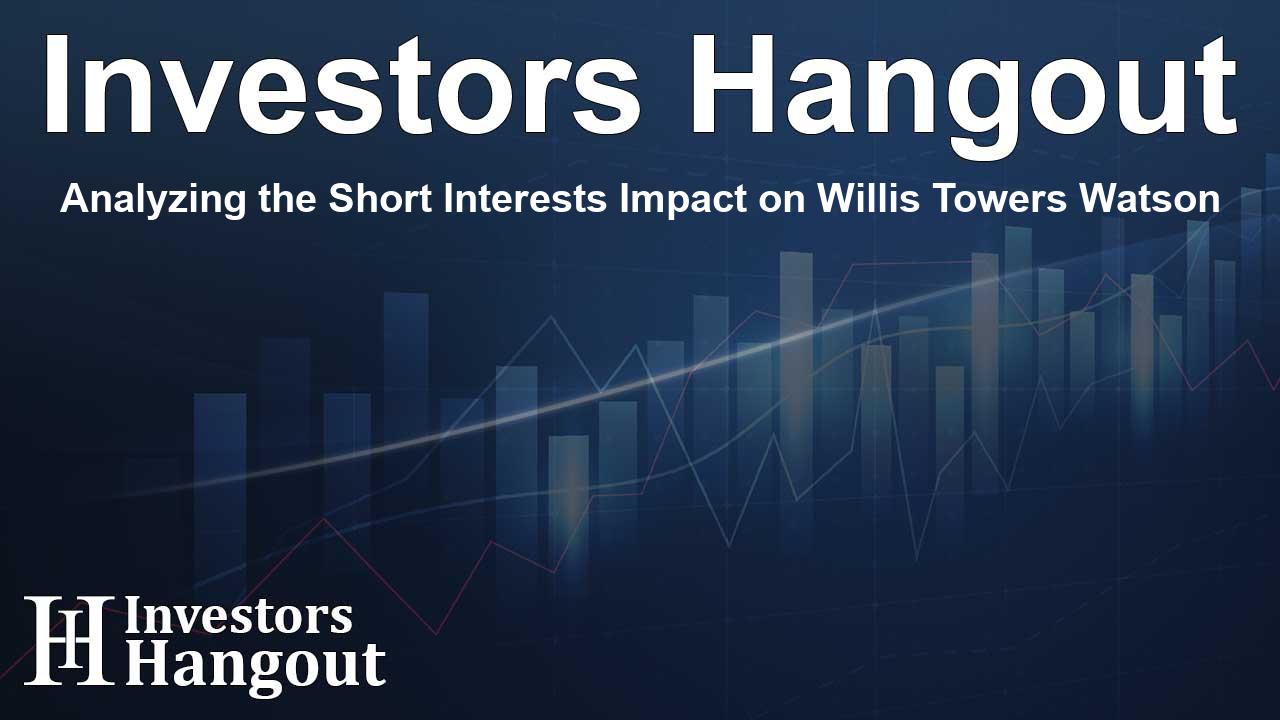Analyzing the Short Interests Impact on Willis Towers Watson

Understanding Short Selling in the Market
Willis Towers Watson (WTW) has recently experienced a noticeable shift in its short percent of float, which now stands at an increased rate of 20.12%. According to the latest report, there are approximately 3.07 million shares sold short, constituting about 4.06% of all regular shares available for trading. This high short interest indicates that, on average, it would take traders about 4.11 days to cover their short positions based on current trading volumes.
The Importance of Tracking Short Interest
Short interest denotes the total number of shares that have been sold short but have not been closed out or covered. It serves as a crucial indicator of market sentiment, as short selling is a strategy where traders sell shares they do not own, betting that their price will decline. If the stock price does fall, the traders can buy back shares at a lower price, thus profiting from the difference. Conversely, a rise in stock price can lead to significant losses for those holding short positions. Therefore, keeping a close watch on short interest can reveal the prevailing attitudes of investors towards a stock.
Visualizing the Trend: Willis Towers Watson's Short Interest
A glance at the short interest graph for Willis Towers Watson over the recent months illustrates a concerning trend. The percentage of outstanding shares that are sold short has increased substantially, which might indicate bearish sentiment among investors. Although this trend does not automatically predict a decline in the stock price, it is a sign that more traders are betting against WTW.
Analyzing Peer Comparisons for Better Insight
When evaluating a company's performance, conducting a peer comparison is a valuable analytical strategy. This involves comparing short interest percentages of similar companies in the same industry or field. For WTW, its peer group averages a lower short interest at 3.75%. This comparison suggests that WTW is experiencing significantly higher short interest than most of its competitors, which might be indicative of investor concerns specific to the company.
Can Increased Short Interest Be Bullish?
Interestingly, an increase in short interest can sometimes present a bullish opportunity for savvy investors. This phenomenon occurs during a short squeeze, where traders who have shorted a stock are forced to cover their positions—often leading to a rapid increase in stock prices. This possibility highlights the dual nature of short interest as both a cautionary signal and a potential opportunity for profit under the right circumstances.
Conclusion: Navigating the Short Interest Landscape
For investors and analysts, understanding the nuances of short interest, especially concerning a company like Willis Towers Watson (WTW), could be pivotal in making informed investment decisions. As trends evolve, monitoring market sentiments reflected in short positions can offer significant insights into the future performance of the stock.
Frequently Asked Questions
What is short interest?
Short interest refers to the number of shares that investors have sold short but have not yet repurchased. It serves as an indicator of market sentiment regarding a particular stock.
How does short selling work?
In short selling, an investor sells shares they do not own, hoping to buy them back at a lower price later, profiting from the difference if the stock declines.
Why is short interest compared among peers?
Comparing short interest among similar companies helps identify performance anomalies and assess investor sentiment more effectively.
Can high short interest be a positive signal?
Yes, in certain conditions, increased short interest can lead to a short squeeze, potentially resulting in a surge in a stock's price.
What should investors consider with rising short interest?
Investors should assess why short interest is rising, consider market trends, and evaluate whether there is an opportunity to capitalize on potential price movements.
About The Author
Contact Dominic Sanders privately here. Or send an email with ATTN: Dominic Sanders as the subject to contact@investorshangout.com.
About Investors Hangout
Investors Hangout is a leading online stock forum for financial discussion and learning, offering a wide range of free tools and resources. It draws in traders of all levels, who exchange market knowledge, investigate trading tactics, and keep an eye on industry developments in real time. Featuring financial articles, stock message boards, quotes, charts, company profiles, and live news updates. Through cooperative learning and a wealth of informational resources, it helps users from novices creating their first portfolios to experts honing their techniques. Join Investors Hangout today: https://investorshangout.com/
The content of this article is based on factual, publicly available information and does not represent legal, financial, or investment advice. Investors Hangout does not offer financial advice, and the author is not a licensed financial advisor. Consult a qualified advisor before making any financial or investment decisions based on this article. This article should not be considered advice to purchase, sell, or hold any securities or other investments. If any of the material provided here is inaccurate, please contact us for corrections.
